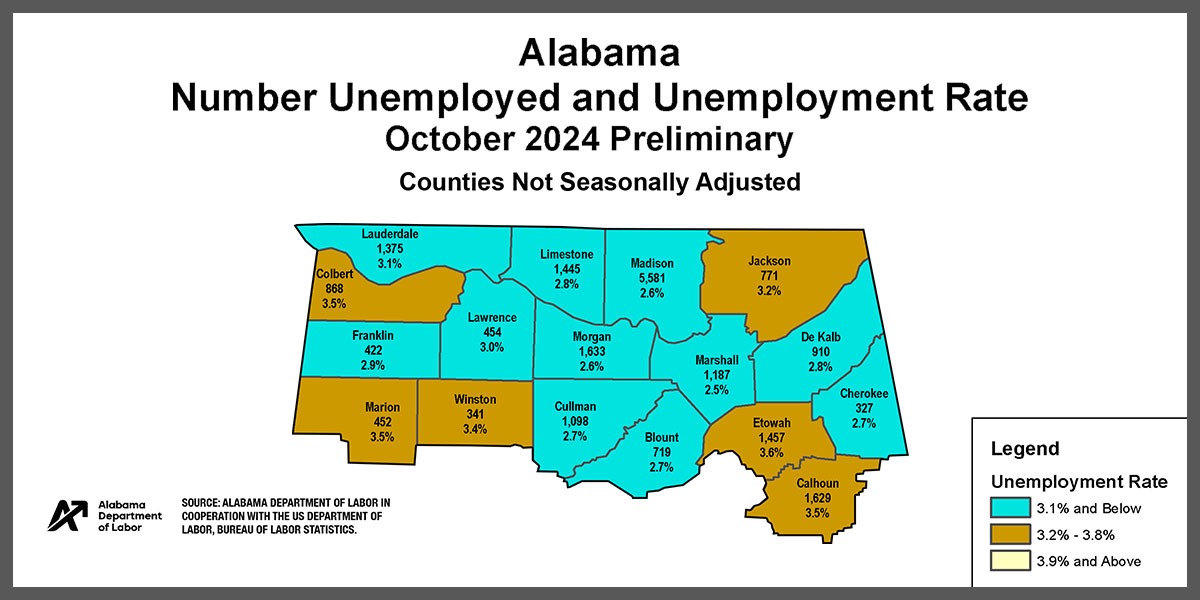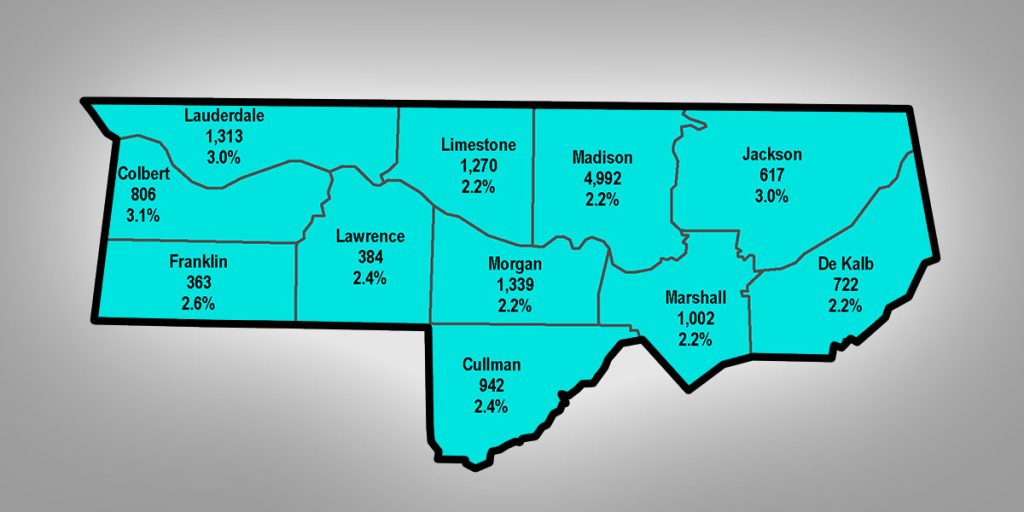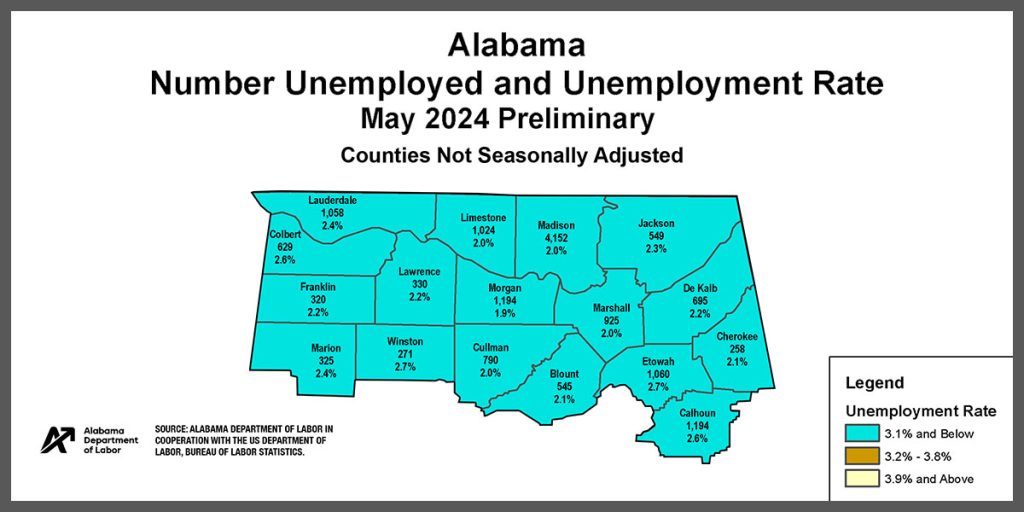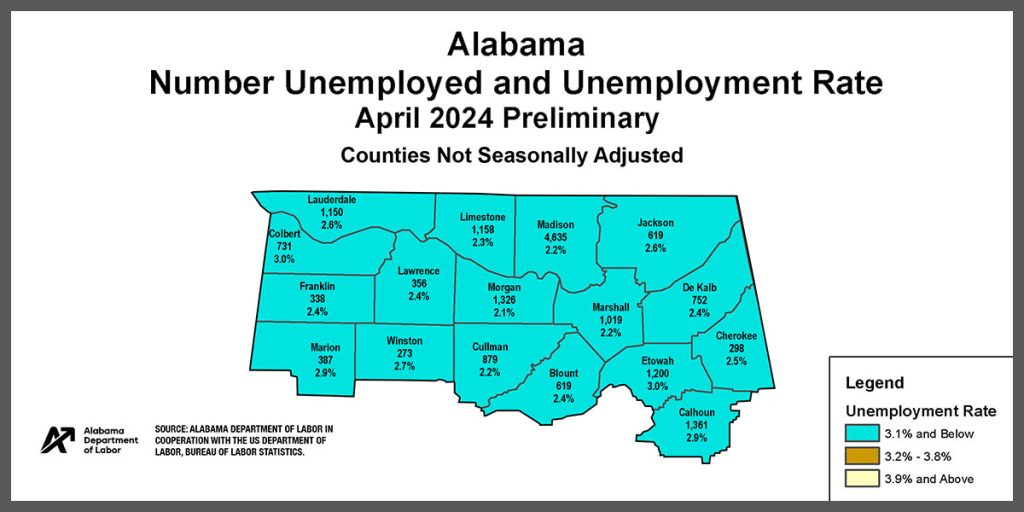MONTGOMERY – While the state’s labor force participation rate increased, Alabama’s unemployment numbers also showed a hike from a year ago.
According to Department of Labor Secretary Marty Redden, Alabama’s labor force participation rate for October increased by one-tenth of a percentage to 57.6%. The percentage of prime-age workers decreased by two-tenths of a percentage point to 79.1% over the month. Over the year, this number increased by one percentage point from 78.1%. Prime-age workers are those aged 25-54 years.
“This month we experienced a slight increase in our labor force participation rate. Any growth is always welcome news,” said Redden. “Additionally, the year over year growth of prime age workers is also encouraging. Nearly 80% of those prime age workers are out there doing their jobs and providing for their families.”
Alabama’s preliminary, seasonally adjusted unemployment rate for last month is 2.9%, unchanged from September 2024’s rate but higher than the October 2023 rate of 2.8%. The rate represents 69,271 unemployed persons, compared to 67,395 in September and 64,027 in October 2023.
Counties with the lowest unemployment rates are: Shelby County at 2.4%, Marshall County at 2.5%, and Madison and Morgan counties at 2.6%; all were higher than a year ago.
In North Alabama, Colbert County’s jobless rate for October was 3.5%, up from 3.1% in 2023; Cullman County was 2.7% last month, up from 2.2% in 2023; DeKalb County, 2.8%, up from 2.2%; Etowah County, 3.6%, up from 3%; Franklin County, 2.9%, up from 2.8%; Jackson County, 3.2%, up from 2.6%; Lauderdale County, 3.1%, up from 2.7%; Lawrence County, 3%, up from 2.4%; Limestone County, 2.8%, up from 2.1%; Madison County, 2.6%, up from 2.1%; Marion County, 3.5%, up from 3.1%; Marshall County, 2.5%, up from 2.2%; Morgan County, 2.6%, up from 2.1%; and Winston County, 3.4%, up from 3%.
Major cities with the lowest unemployment rates are: Homewood, Vestavia Hills, and Trussville at 2.2%, Alabaster and Hoover at 2.3%, and Madison at 2.4%.
The number of people counted as employed grew by 18,840 over the year to 2,280,863, a record high. The civilian labor force also reached a record high, with 24,084 more people joining over the year, bringing the new total to 2,350,134.
Over the year, wage and salary employment increased by 40,400 to 2,220,700, a record high, with gains in the private education and health services sector (+10,500), the government sector (+6,300), and the leisure and hospitality sector (+5,800), among others.
Over the month, wage and salary employment increased by 7,600, with gains in the professional and business services sector (+3,000), the government sector (+2,900), and the private education and health services sector (+1,100), among others.
“While Alabama employers continue to add jobs at record high rates, we’re also seeing wage growth, which is beneficial to our entire economy,” said Redden. “We are currently supporting more jobs than ever before, and our hard-working citizens have seen their average weekly wages increase over the year by nearly $25 a week.”
Average weekly wages increased over the year by $24.97 to $1,056.18. The construction industry also realized its record high wages, peaking at $1,385.67 in October, representing a yearly increase of $114.61 per week.
Counties with the highest unemployment rates are: Wilcox County at 7.7%, Clarke County at 6.1%, and Dallas and Greene Counties at 5.9%.
Major cities with the highest unemployment rates are: Selma at 6.9%, Prichard at 5.7%, and Bessemer at 4.5%.










